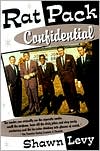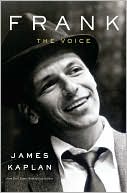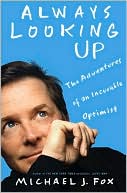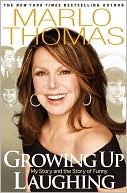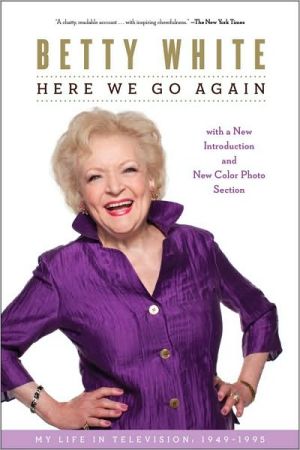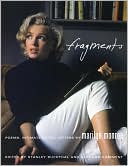Rat Pack Confidential: Frank, Dean, Sammy, Peter, Joey, and the Last Great Showbiz Party
For the first time, the full story of what happened when Frank brought his best pals to party in a land called Vegas\ January 1960. Las Vegas is at its smooth, cool peak. The Strip is a jet-age theme park, and the greatest singer in the history of American popular music summons a group of friends there to make a movie. One is an insouciant singer of Italian songs, ex-partner to the most popular film comedian of the day. One is a short, black, Jewish, one-eyed, singing, dancing wonder. One is...
Search in google:
This was vintage Hollywood. This was showbiz. This was the Rat Pack. Mary Elizabeth Williams One of the weirdest things to happen to the '90s, without a doubt, has been the '50s. One minute, the air stank of grunge and heroin chic; the next, flannel-wearing slackers had become a cocktail nation of martini-sipping swingers. What could be cooler than that which for decades was considered the apotheosis of cheese? And who else could be at the epicenter of retro swank but the undisputed kings of Vegas cool -- Frank, Dino, Sammy, Peter and Joey -- the Rat Pack? But as Shawn Levy's history of "the last great showbiz party" reveals, it was not all fraternal bonhomie and harmless hangovers in the desert with Sinatra and the boys. And what across the distance of time looks like the ultimate fraternity -- a luxurious club where the bar was always stocked, the dames were always beautiful and every show ended on a high note -- was in reality a self-made and highly self-destructive dysfunctional family. The Rat Pack's verminous sobriquet was an apt one. Its members were haunted, hunted creatures, scurrying from one place to the next, scrapping for every morsel of success that came their individual and collective ways. They were bound by the common experiences of tragedy, poverty, prejudice and physical limitations; they were suffocated by mobsters on Frank's side and the Kennedy dynasty on "brother-in-Lawford" Peter's. They were in so deep in all the wrong pockets that they couldn't sing, joke or dance their ways out, and they were too fucked up to notice even if they could have. Maybe it was, briefly, a great party, but the tab turned out to be higher than anybody expected. Levy's chronicle is no breezy read -- something to flip through with one hand while snapping your fingers to "Come Fly with Me" with the other -- though the author does provide plenty of the rat-a-tat scandal-sheet style befitting a book with the word "confidential" in its title. He plunks "broads," "suckers," "dames" and "schmucks" throughout the text like ice cubes in a highball glass. He populates it with seedy joints like a nightclub called El Dumpo, poetically located in Cleveland. And he throws in moments of purely Rat Pack-era machismo -- giving us Sinatra, brushing off an overly familiar U.S. senator with a terse, "Get your hands off the suit, creep." But despite the author's forays into lounge lizard lingo and his positively schoolgirlish adoration of Sinatra's voice ("a gift no more explicable than those of Joyce and Picasso"), the book still packs an emotional wallop. It isn't the crooning or the banter or the suits that matter all that much in the end, despite their current ironic allure. It's that, for all of them except Frank, the King Rat, that moment of glory on the stage of the Sands was so desperately hard-won, and so quickly lost to betrayal and personal decay. The golden light that shone on them must have, for a while, felt very real and very warm. But, as Levy heartbreakingly demonstrates, it was only neon, cold and easily extinguished. -- Salon
This was Frank's baby.\ Onstage, Dean, singing almost straight, then pissing away anything like real feeling with jokes.\ In the wings, Sammy, Peter, Joey.\ Out front, a mob scene: Marilyn, Little Caesar, Kirk, Shirl, Mr. Benny, that Swedish kid that Sammy was so crazy for, that senator and his tubby kid brother, a few broads without addresses, a few guys without real names . . .\ Famous faces at ringside for the cameras, infamous ones in the shadows in the back, plus a hundred or so civilians as bait for the rest of the world—suckers with money to blow and dames to blow it with them until it ran out.\ In the casino, every schmuck that couldn't pay or beg or muscle his way in was betting his rent money just to feel as big as the ones who could.\ The joint was packed; the rest of town might as well have been dark.\ And for what?\ A movie, a party, a floating crap game, a day's work, a hustle, a joke: They'd make millions and all they had to do was show up, have a good time, pretend to give a damn, and, almost as an afterthought, sing.\ Sometimes it seemed like Dean had the right idea: "You wanna hear the whole song, buy the record . . ."\ But there was something in the music, wasn't there? With the right band and the right number, it was like flying—and like you could drag everybody up there with you.\ So let Dean do jokes, and Sammy—Sammy would start numbers and they'd stomp all over them and he'd like it.\ But when Frank sang, it would be straight. It could be New Year's Eve, the very stroke of midnight, the middle of Times Square, and he would stop time, stop their hearts beating, and remind them where the power was.\ It was in his voice.\ It was his.\ When they finally had enough and dropped the curtain, they would wander out into the casino.\ Some act'd be up there on the little stage in the lounge, and maybe they'd go over and screw around; Sammy liked that the best—more eyes on him, always more eyes.\ What Dean and Frank liked was dealing. They had points in the joint, and who was gonna stop them from horsing around at a table: It was their money, right?\ Dean actually knew what he was doing. He'd push aside a blackjack dealer and do a little fancy shuffling and start dealing around the layout: his rules.\ "You got five? You hold. That's a winner.\ "Nineteen? Hit. Twenty-six? Another winner."\ He'd shovel out chips and make sure that everyone took care of the real dealer, who'd stand there looking nervous over at big Carl Cohen, the casino manager, who normally didn't go for clowning.\ But Carl would be quiet. He'd lose a couple hundred during this monkey show, sure, but he'd get it all back and more: There were crowds five or ten deep just waiting to get at the tables. Besides, Dean was like family; he'd worked sneak joints back in Ohio before the war with Carl's kid brother. The big guy could afford to be a little bit indulgent.\ Which wasn't the case with Lewis Milestone, the poor director saddled with making a movie in the middle of it. Every morning he came to work in an amusement park that his boss owned and woke his boss up and tried to get him to jump through hoops for a few hours, and you had to look deep into his dark old eyes to see what he really thought about it.\ This movie wasn't some work of art, this wasn't All Quiet on the Western Front with poetic butterflies and mud and a moral. This was a sure thing, a money machine, a way to bring the party to the people who could only read about it in the papers. Hell, the only reason they hired him in the first place was that Jack Warner insisted on a pro and Peter guaranteed that the old guy—who was making Lassie shows, for chrissakes—would do whatever they told him.\ But, still, they didn't want to make a career out of it. So come the morning, they let Millie run them around in circles for a little bit, even if they hadn't gone to sleep yet on account of last night was, as they liked to say, a gasser.\ Or at least everyone but Frank let him do it. Frank was the boss, after all, and picture or no picture, he was going to work when he felt like it. He used to say that he only had one take in him, like he was an artist about it. The truth was he only had one take he gave a shit about, and if they wanted that one in the movie, then they'd have to wait until he was ready to give it.\ So Sammy, a Salty Dog or two down the hatch, would show up on the set at 9:00 or 10:00 in the morning, and Dean and Peter would show up at 9:00 or 10:00 in the morning, and Joey—who was lucky to be here at all, let's face it—would be there at 7:00 or whenever they said so, showered and alert.\ But Frank: 4:30 in the afternoon, maybe 5:00; and twice, twice, before lunch; and most days not at all.\ They worked on the picture twenty-five days in Vegas; Frank showed up nine.\ Oh, it was his show, all right.\ In the early evenings, between a few hours of the movie and going back out onstage, the steam room. Frank had it built—the first one on the Strip—and when he was in town it was off limits to anyone else. They'd drink in there and make phone calls and give each other the needle: the only time they could all be together and alone.\ Some other people were allowed in: the ultimate VIP room. This Rickles would take these incredible liberties with Frank and Frank would kill himself. Sammy would take one humiliation after another—"You can't wear a white towel. Here's a brown towel for you!"—and act like he was killing himself. Actors from the movie. Business guys. Other guys who didn't say who they were. This was an inner inner circle. Men capable of all sorts of acts of power would sit like convent girls just for the pleasure of having been allowed inside. Compared to this, the show and the movie were, well, for anyone.\ But not just anyone was welcome. This was a group that Frank handpicked, gliding through the world, sizing people up, then giving them the golden tap on the shoulder and bringing them in.\ Talent, money, power: None of these was quite enough. You had to have something Frank had, or something that he wanted to have more of. You were a cool, leonine Italian, or a dazzling black ball of fire, or a British sophisticate with powerful relatives, or a Jewish wiseguy who could brush off the world with a shrug. You were an Irish millionaire senator or a psychotic Mafia lord. You were the acme, the original, one of a kind, and Frank wanted you up close to study. He gathered everyone around him and sat in the middle and saw little parts of himself, little things he could fix or steal—Dr. Frankenstein building a hip new kind of superman.\ Frankenstein, though, or Nosferatu? Because, though everyone got rich, got famous, got laid, Frank got more. They made movies; Frank was the producer. They cut records; Frank owned the company. They played Vegas and Tahoe; it was Frank's hotel. Everyone did good work; Frank was Michelangelo.\ They called him the Leader; they asked him to be their best man; they named their kids after him, their daughters, even. And when it all spun out of control, when the precious, delicate balance came undone, when the merry-go-round stopped with a jerk, everyone got thrown on their ass—or worse—except Frank, who stood there in the middle, unfazed.\ Divorce, drugs, bankruptcy, death, irrelevancy: Every single one of them took a major hit.\ Frank didn't get so much as a scratch.\ But that would all be later. That would be after the golden time, when, for a while, no matter what they did, it would sell. No matter how many broads, no matter how much booze, no matter who they got mad at or cozied up to, it had reached a point where Frank could simply do no wrong.\ The press knew the story. They didn't write it, but they knew it. They didn't rat him out because they needed him more than he needed them, and except for a few he'd chosen as whipping boys, they lined up to do whatever he wanted them to do.\ He was drinking with this one or that one or fucking this one or that one—who was gonna talk?\ And anyone he wanted around him, the same thing: You hiding from the G? You don't need to hide around Frank. You got a wife back home who reads the gossip page? Frank'll see that you're not in it. You running for president? Frank'll throw a little juice your way and make sure everything looks on the up-and-up.\ Up close, the whole thing was not to be believed. You wanna talk about rebellion? Those rock 'n' roll punks had no idea what a real rebel did in private. They couldn't begin to understand the power and the appetites and how little you had to care. La Dolce Vita nothing: This bunch made Nero look like a Cub Scout.\ But outside, from far away, it didn't look like ego or license or indulgence. It looked like a big, beautiful party in the desert, with laughs and music and cars and clothes and incredible women, and no one ever ran out of money, and no one ever got tired, and no one had to answer to anyone, and no one ever grew old, and you would just die unless you could be there—even if the closest you ever got was a movie theater or a record player.\ Wherever they went, they drew a crowd. And not just yokels, but Friars and sex symbols and made men and the president himself. They made Vegas Vegas, Miami Miami, and Palm Springs Palm Springs. And they made and broke people like they were pieces of toast.\ For a while, everything took a backseat. For a while, the whole world was like a gyroscope, spinning so fast that it looked like it was standing still, with Frank and his cronies smack-dab in the middle of it, smiling at you, making you think you could do anything.\ The world wasn't big enough for them to bother with so they made it bigger and took it over.\ And instead of resenting it, people loved it.\ And there was never anything like it before or since.\
\ Mary Elizabeth WilliamsOne of the weirdest things to happen to the '90s, without a doubt, has been the '50s. One minute, the air stank of grunge and heroin chic; the next, flannel-wearing slackers had become a cocktail nation of martini-sipping swingers. What could be cooler than that which for decades was considered the apotheosis of cheese? And who else could be at the epicenter of retro swank but the undisputed kings of Vegas cool -- Frank, Dino, Sammy, Peter and Joey -- the Rat Pack?\ But as Shawn Levy's history of "the last great showbiz party" reveals, it was not all fraternal bonhomie and harmless hangovers in the desert with Sinatra and the boys. And what across the distance of time looks like the ultimate fraternity -- a luxurious club where the bar was always stocked, the dames were always beautiful and every show ended on a high note -- was in reality a self-made and highly self-destructive dysfunctional family.\ The Rat Pack's verminous sobriquet was an apt one. Its members were haunted, hunted creatures, scurrying from one place to the next, scrapping for every morsel of success that came their individual and collective ways. They were bound by the common experiences of tragedy, poverty, prejudice and physical limitations; they were suffocated by mobsters on Frank's side and the Kennedy dynasty on "brother-in-Lawford" Peter's. They were in so deep in all the wrong pockets that they couldn't sing, joke or dance their ways out, and they were too fucked up to notice even if they could have. Maybe it was, briefly, a great party, but the tab turned out to be higher than anybody expected.\ Levy's chronicle is no breezy read -- something to flip through with one hand while snapping your fingers to "Come Fly with Me" with the other -- though the author does provide plenty of the rat-a-tat scandal-sheet style befitting a book with the word "confidential" in its title. He plunks "broads," "suckers," "dames" and "schmucks" throughout the text like ice cubes in a highball glass. He populates it with seedy joints like a nightclub called El Dumpo, poetically located in Cleveland. And he throws in moments of purely Rat Pack-era machismo -- giving us Sinatra, brushing off an overly familiar U.S. senator with a terse, "Get your hands off the suit, creep."\ But despite the author's forays into lounge lizard lingo and his positively schoolgirlish adoration of Sinatra's voice ("a gift no more explicable than those of Joyce and Picasso"), the book still packs an emotional wallop. It isn't the crooning or the banter or the suits that matter all that much in the end, despite their current ironic allure. It's that, for all of them except Frank, the King Rat, that moment of glory on the stage of the Sands was so desperately hard-won, and so quickly lost to betrayal and personal decay. The golden light that shone on them must have, for a while, felt very real and very warm. But, as Levy heartbreakingly demonstrates, it was only neon, cold and easily extinguished. -- Salon\ \ \ \ \ \ Library JournalIt used to be Frank Sinatra's world: Women were broads, the whole world was a smoking section, and booze flowed freely. And at no time was it more Frank's world than when the Rat Pack was in session. Sinatra was the center of the group, with Dean Martin and Sammy Davis Jr. completing the nucleus. Peter Lawford, Joey Bishop, and Shirley MacLaine, the only female admitted, comprised the periphery. Since Sinatra's 80th birthday in 1995 was commemorated by at least a half-dozen books, one might think that all that could possibly be written about Sinatra already has. Indeed, most of the material in these books has been seen before in the biographies and autobiographies of the various Rat Pack players, but each book finds its own angle. Quirk author of a string of movie-star biographies and Schoell a novelist and author of books on film concentrate a bit more on the various Rat Pack films. Levy author of a Jerry Lewis biography and former editor at American Film digs somewhat deeper into Sinatra's connections with politics and organized crime. In light of Sinatra's recent death, there will likely be demand for more material on him, and these boks will be welcome additions to circulating popular culture collections.Michael Colby, Univ. of California at Davis Lib.\ \ \ Kirkus ReviewsLevy shifts the focus from one of show business's great egotists, Jerry Lewis (King of Comedy>o?, 1996), to entertainment's most hedonistic gathering of narcissists, the Rat Pack. Most of its members were larger than life—Frank Sinatra, Dean Martin, Sammy Davis, Peter Lawford. Joey Bishop wasn't, of course, but that was his charm. They gathered in Las Vegas in 1960 for the shooting of the less-than-immortal film Ocean's Eleven, an event that turned into one huge party, a lengthy day-and-night celebration of booze, broads, and bucks. With this lunatic extravaganza as its pivot point, the book traces the rise and fall of this quintet of famous men, trying somewhat vainly to explain their hipper-than-thou attitudes as some part of the Zeitgeist that produced the wretched excesses of the Kennedy White House. As Levy himself notes in the acknowledgments to the book, the lives and peccadilloes of these men are amply documented in dozens of books. We are treated to a snappily written retelling of Sinatra's rise from working-class Hoboken, NJ, fueled by his mother's high-octane shoving, to his success as teen idol and band singer, his catastrophic fall from grace in the early '50s and no less meteoric return with the film From Here to Eternity and a series of classic recordings for Capitol Records. Levy embroiders on the story of Martin's even more improbable success, which he touched on in the Lewis bio. Indeed, except for the material on Joey Bishop, which is (surprisingly enough) downright delightful, there isn't much that is unfamiliarþthe Rat Pack's dalliances with the Kennedys, ties to the Mob, decline and fall. And although Levy's take on all this issuitably critical, there is something creepily voyeuristic about the relish with which he peddles these tales. (16 pages b&w photos, not seen) \ \
